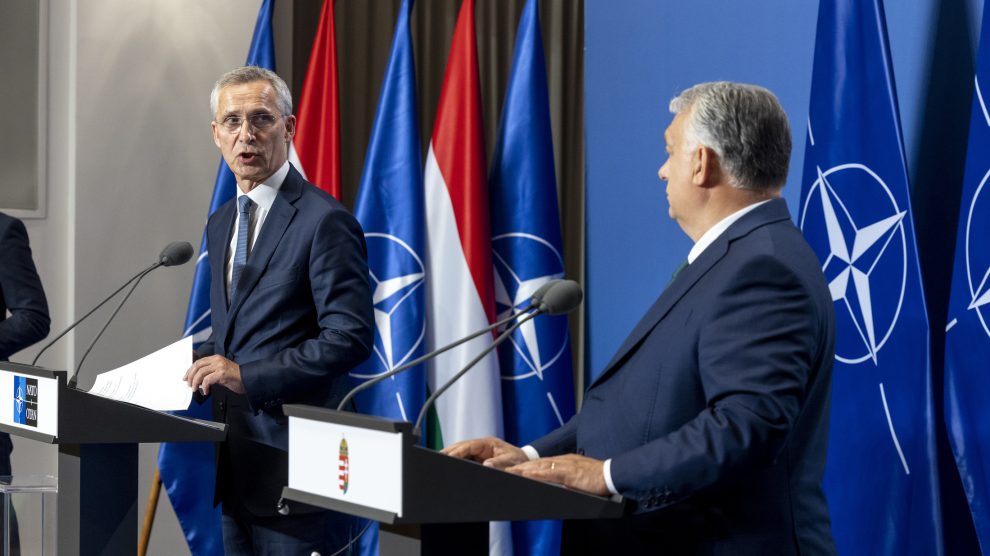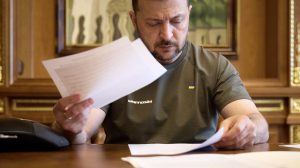Catch up quickly with the stories from Central and Eastern Europe that matter, this week led by news of a major compromise at NATO that is likely to boost support for Ukraine.
Russia’s war on Ukraine
There was a major boosts for Ukraine this week when Hungary agreed not to veto NATO support for Kyiv.
However, Hungarian Prime Minister Viktor Orbán insisted that his government would provide neither funds nor military personnel for any joint assistance effort.
At a summit in Washington next month, US President Joe Biden and his NATO counterparts are expected to agree on a new system to provide more predictable, long-term security help and military training to Ukraine’s beleaguered armed forces.
Ukraine’s Western allies are trying to bolster military support for Kyiv as Russian troops launch attacks along the more than 1,000-kilometre front line, taking advantage of a lengthy delay in US military aid.
“Hungary made it clear at today’s meeting that it does not want to block decisions in NATO that … are decisions shared and advocated by the other member states,” Orbán told reporters after talks in Budapest with NATO Secretary-General Jens Stoltenberg.
“I asked the Secretary-General to make it clear that all military action outside NATO territory can only be voluntary in nature, according to NATO rules and our traditions,” said Orbán, who has tried to style himself as a peacemaker. “Hungary has received the guarantees we need.”
A second boost for Kyiv came on Thursday when G7 leaders meeting in Rome looked set to back a deal to use interest from Russian assets for Ukraine.
Heading into two days of talks on Thursday, diplomats said the deal had been agreed in principle on plans to issue 50 billion US dollars of loans for Ukraine using interest from Russian sovereign assets frozen after Moscow launched its invasion of its neighbour in 2022.
“I think it’s done,” said one EU official. “It should be fine. I don’t expect leaders to say…(anything against it).”
A person close to the talks said the point of deal was to ensure it can run for years regardless of who is in power in each G7 state—a nod to concerns that US Republican presidential candidate Donald Trump might be much less favourable to Kyiv if he beats Biden in November.
The reconstruction of Ukraine should be based on the principle of ‘Build Back Better’ as well as the green and digital transformation of its economy.
This is the main recommendation of a study published this week by the Vienna Institute for International Economic Studies (wiiw) and the Bertelsmann Stiftung. Six areas of the Ukrainian economy, in particular, harbour great potential for success and could be of interest to investors: renewable energy, rare raw materials, metal processing, mechanical engineering, the food industry, and IT.
Focusing on these sectors should enable Ukraine to leapfrog in terms of economic development and establish technologically advanced sectors with higher added value. It could also significantly advance the country’s integration into the EU single market even before accession.
“However, this will require institutional reforms in the areas of the rule of law and anti-corruption, which must be combined with industrial policy and a strategy to attract foreign direct investment,” says Olga Pindyuk, an expert on Ukraine at wiiw and co-author of the study.
Other news from the region
The Rail Baltica project may need up to 19 billion euros more investment than planned, auditors from Lithuania, Latvia and Estonia said this week in a joint report. One of the EU’s biggest infrastructure projects, Rail Baltica is meant to connect the three countries and Poland with a European-gauge high-speed railway. The construction, however, has been beset by delays. “The Rail Baltica project’s progress is at risk because its estimated cost has quadrupled over seven years and the project’s size could lead to a budget deficit of 10–19 billion euros,” the auditors said on Wednesday.
Armenia will formally withdraw from its military alliance with Moscow, the country’s prime minister announced Wednesday, as tensions grow with Russia. Nikol Pashinyan declared in parliament that “we will leave” the Kremlin’s Collective Security Treaty Organisation (CSTO), and that “we will decide the timing of our exit.” Pashinyan added that, “members of the alliance are not fulfilling their contractual obligations, but are planning a war against us with Azerbaijan.” The military bloc—Russia’s answer to NATO—is made up of six states: Russia, Armenia, Belarus, Kazakhstan, Kyrgyzstan and Tajikistan.
Hungary disagrees with Europe’s “brutal” punishment of Chinese electric car manufacturers, its economy ministry said on Wednesday, after the European Commission imposed tariffs on Chinese electric vehicle (EV) imports. “Instead of punitive tariffs, the EU should support the European EV industry,” the ministry said in a statement. The Commission on Wednesday imposed extra duties of up to 38.1 per cent on imported Chinese EVs from July. “We disagree with the brutal European punishment of Chinese electric car manufacturers with punitive tariffs,” the ministry added.
On Thursday, the EU’s top court said that Hungary will have to pay a 200 million euros fine for not implementing changes in its policy of handling migrants and asylum seekers at its border. Budapest, which has previously refused to carry out the 2020 court ruling, will also be required to pay a daily fine of one million euros until it fully implements the measures. The government has previously argued that the 2020 ruling was moot as it had already closed so-called “transit-zones” while also hardening rules to bar future asylum applicants.
Workers at Slovakia’s public broadcaster RTVS went on strike on Monday to protest against government plans to relaunch it under new leadership, which employees say will bring news and other content under government control. The strike, which did not affect television or radio broadcasts, comes amid wider worries over Slovakia after the election of Robert’s Fico government last year. Several dozen workers at RTVS marched from a central square in Bratislava to the Culture Ministry, shouting “Free Media!” and “We’re not giving up RTVS!”, according to the Dennik N news website.
The Czech prime minister, Petr Fiala, has said a failed arson attack that took place in Prague last week was “very likely” organised and financed by Russia. Speaking on Monday after a meeting of the Czech National Security Council, Fiala said the failed attack was evidently part of a “hybrid” campaign of sabotage being run by Moscow against European countries. This campaign, he said, included May’s arson attack in Poland’s capital Warsaw, and a similar attack in a branch of Ikea in Lithuania, which authorities believe were carried out by Russian intelligence agents or their proxies.
Lawmakers in the Polish parliament observed a minute of silence on Wednesday to honour a young soldier who was stabbed at the Polish-Belarusian border amid a migration crisis that Poland says has been engineered by Russia and Belarus. The soldier, Mateusz Sitek, was stabbed in the chest by a migrant who thrust a knife through a gap in a steel fence on May 28, dying of his wounds on June 6. Sitek was laid to rest in private observances on Wednesday in his home village of Nowy Lubiel in central Poland while a special Mass was held in his honor at the Field Cathedral of the Polish Army in Warsaw.
The Uzbek government appears willing to loosen its control over the flow of information within Central Asia’s most populous nation as part of a comprehensive reform initiative to enhance its membership qualifications for the World Trade Organisation. President Shavkat Mirziyoyev has expressed a desire for Uzbekistan to gain WTO membership as soon as 2026. On June 3, Mirziyoyev issued a decree authorizing a broad array of economic reforms intended to bring Uzbekistan’s trade rules into closer alignment with WTO standards.
Photo: NATO.
Unlike many news and information platforms, Emerging Europe is free to read, and always will be. There is no paywall here. We are independent, not affiliated with nor representing any political party or business organisation. We want the very best for emerging Europe, nothing more, nothing less. Your support will help us continue to spread the word about this amazing region.
You can contribute here. Thank you.







Add Comment